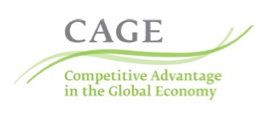On 2 November, the Bank of England raised interest rates for the first time in over a decade. The Bank had signalled its intentions well in advance, yet reaction to the rise was mixed, with many commentators questioning its timing.
In this joint briefing by Social Market Foundation and the Centre for Competitive Advantage in the Global Economy (CAGE) at Warwick University, Professor Michael McMahon drew on his research to explore a number of issues surrounding the Bank of England’s recent actions, including:
- What do the Bank of England see that made them increase interest rates?
- Why did the Bank decide to signal the move in advance?
- Financial markets, and particularly the exchange rate, reacted in the “wrong way” to the interest rate increase. Why?
- Should we expect to see further interest rate increases in the coming months?
- The Bank of England has just launched a new version of its quarterly Inflation Report, aimed at a broader audience. Why is the Bank trying to communicate beyond its usual audience of financial journalists and market participants?
Speaker
Michael McMahon
Professor of Economics, University of Oxford
Director for Impact, Centre for Competitive Advantage in the Global Economy (CAGE)
About the speaker
Michael McMahon is a Professor of Economics at the University of Oxford, and a Fellow of St Hugh’s College. He is also the Director for Impact at CAGE. A macroeconomist, his interests lie in study of fiscal policy, business cycles, monetary economics, inventories and applied econometrics. Recently, together with Stephen Hansen, he has written a series of papers examining the way monetary policy is made and how institutional design features of central banks and their monetary policy committees influence the decisions. Much of his recent research uses the tools of computational linguistics to understand communication and deliberation in central banks. Professor McMahon’s research has been published in many top journals including the Quarterly Journal of Economics, the Review of Economic Studies, the Journal of Monetary Economics, the Review of Economics and Statistics, the Journal of International Economics and the Journal of Applied Econometrics.

